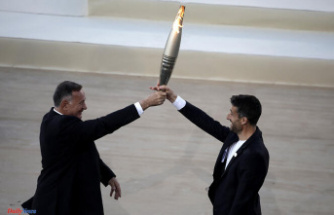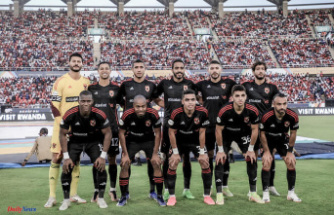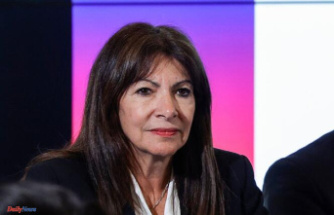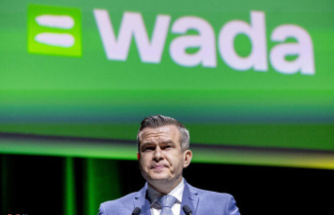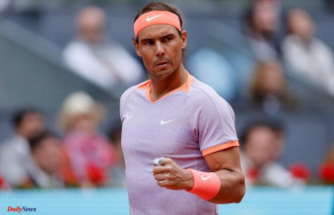The "nugget", as his coach calls him, shone. A luminous game like the parquet floor of the Kigali Arena in Rwanda. And an insolent performance: top scorer (28 points) in this semi-final of the Basketball Africa League (BAL), a new pan-African competition funded by the NBA, the prestigious American league. On Wednesday May 24, Jean-Jacques Boissy, leader of AS Douanes de Dakar, allowed his team to defeat the colossi of Petro de Luanda, so feared on the continent (86-92).
The Senegalese will meet in the final, Saturday, May 27, the Egyptians of Al-Ahly and try to win the title of African club champion. A finalist place that confirms an intuition: it was time to return home. "A bet", specifies Jean-Jacques Boissy, surprising for some, inconceivable for others, sensible for him.
A few weeks earlier, the 23-year-old Senegal international sat in the stands at the Marius Ndiaye stadium in Dakar. No training for him: he had to go to the hospital to monitor a small injury on his upper thigh. Sweating under the dome of this arena is a step back in time: time seems to have frozen in the 1990s. The walls are battered, the chairs barely stand on their four legs. In short, not much is up to standard. The ball has trouble bouncing on this heavy and damaged floor "because it is very busy, all the basketball teams in the city train here", explains coach Mamadou Gueye Pabi. And the rings of the two panels are so rigid that they prevent players from being precise in their shots.
Despite these difficult conditions for a high-level athlete, Jean-Jacques Boissy signed up with Customs at the start of the year. Until then, he wore the jersey of CB Cornella, a Catalan third division team. Why drop a professional world in Europe to play in a still amateur league in Senegal? "It's an investment I make in myself," he points out. I have more opportunities with Customs in Dakar because they play the BAL. It is difficult to contradict him.
A continental competition
In three seasons of existence, the Basketball Africa League is already beginning "to give another image of the continent", assures Mamadou Gueye Pabi. For three decades, the NBA has taken a very close interest in Africa: having notably organized youth camps in South Africa (2003), opened an office in Johannesburg (2010) and a training center in Saly, Senegal (the NBA Academy Africa, in 2017), the NBA launched, in partnership with the International Basketball Federation (FIBA), a continental competition. "We take care of everything, it's a considerable investment", underlines the Senegalese Amadou Gallo Fall, president of the BAL and vice-president of the NBA.
What is the principle of this tournament? Twelve clubs from twelve countries compete, six in the new Diamniadio stadium, located not far from Dakar (Sahara conference), six others in Cairo (Nile conference) and the best meet in Kigali for the playoffs. “Very honestly, in terms of organization, there is no better in Africa, assures Woury Diallo, Senegalese journalist at Le Quotidien. If we close the doors of the stadium, it looks like we are in the NBA. »
Show, atmosphere, light… The means and know-how of the Americans seem to have no limit. The flooring and basketball backboards for the tournament were even imported from the United States. "When we played our first BAL game in March, I didn't recognize my players, they had no bearings. Some had never walked on such a floor, ”admits the Customs coach. "The standard is very high, the NBA has done nothing cheap," said Matar Bâ, former sports minister of Senegal (2014-2022), now chief of staff to President Macky Sall.
“The BAL pushes us to professionalize ourselves,” explains Jack Mactar Dieng, Vice President of Customs. Moreover, each club has the obligation to sign a professional contract with the players involved in the competition and to pay them at least 1200 euros per month for the duration of the tournament (four months maximum). And to raise the level of the teams, the latter have the possibility of enlisting two African basketball players and two players from other continents. For example, AS Douane recruited two Americans, a Nigerian and a South Sudanese. “But it is expensive, the salary of an American is 10,000 dollars without transportation or accommodation costs, details Mr. Dieng. To help us, the BAL subsidizes us up to 70,000 dollars. But it is too little, the competition is very expensive. »
"Unexpected visibility for African players"
This is the price to pay to participate in a high-end product. "This tournament above all offers unexpected visibility for African players," notes Babacar Ndiaye, president of the Senegalese Basketball Federation. And for good reason: according to BAL, the event is "accessible to fans" from 214 countries in 17 languages, broadcast on free-to-air and pay channels (ESPN Sub-Saharan Africa, NBA TV, Tencent or TV5 Monde), followed by "more of 250 media professionals".
Precisely, it is this "visibility" that Jean-Jacques Boissy sought when leaving Europe. "Thanks to the BAL, many African players, like Jean-Jacques, return or wish to return to their country, it was unimaginable three years ago, ignites Abdoul Aziz Mbodj, former president of Dakar University Club (DUC ), team that took part in the competition in 2022. I remember having proposed, a very long time ago, to a friend who was struggling in France to relaunch in Senegal, he said to me: “You don't want me not good”. Jack Mactar Dieng corroborates these remarks even evoking "a paradigm shift", which shows that African basketball is taking the right path.
Like so many other basketball players, Jean-Jacques Boissy has a dream: to wear the jersey of an American championship franchise. "When you play this competition, you get a little closer to the NBA. That's why the BAL is an opportunity for your career to take off, you never know who's watching, "he says, hoping that a big team across the Atlantic or even from the G-League (minor league, antechamber of the NBA) discover it. "Players can have a contract anywhere in the world," says Mamadou Gueye Pabi.
Before the start of the tournament, the Customs coach received lots of calls from agents looking to place basketball players on his team. "Mexicans, Indians, basketball players from five continents now want to play in a club that plays in the BAL," says Adam Bamba, a FIBA-certified Ivorian agent. They feel like they are going to the NBA but to Africa. »


